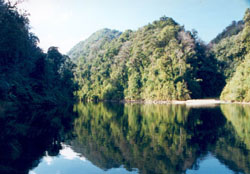
China has more than 10% of the total species of vascular plants and terrestrial vertebrates in the world, of which about half are endemic to this country. To protect its biodiversity, China has made remarkable achievements in nature reserve establishment. However, scientists observe that these protected areas are facing serious challenges. In an article in the May 23 issue of
Science, a group of ecologists call for stepping up the management of the natural legacies in China.
More than 1,700 national and local nature reserves have been set up in China since the mid-1950s. Most of them were established by local governments, with ultimate approval by higher authorities. This bottom-up approach rescued many threatened ecosystems and endangered species from immediate loss. However, it has been opportunistic, as it lacks systematic planning and an adequate conceptual base, according to an international research team headed by Prof. LIU Jianguo of Department of Fisheries and Wildlife of Michigan State University.
The reserve system needs well-coordinated management under the central government, the ecologists say. A new State Administration for Nature Reserves should be established with increased authority and funding, as well as a comprehensive Nature Reserve Law at the national level, they suggest.
"We've learned how to set up reserves, now we have to explore how to manage the reserves better," says OUYANG Zhiyun, Director of CAS Key laboratory of Systems Ecology and co-author of the article. Liu and Ouyang have spent last couple of years exploring China's nature reserves with support from domestic and international organizations including CAS. "We integrate ecology with socioeconomics and human demographics and behavior," Liu says. His recent discovery about the impact of the increasing number of households on worldwide biodiversity has drawn world-wide attention.
The funding of China's national reserves is lower than the average in developing countries, according to the scientists. Additional funds might be sought from the private sector and from non-governmental organizations and international organizations for the proper management of all reserves, the scientists claim.
The reserves will survive only if legitimate concerns of the local residents and neighbors are respected and addressed. Tourism and resource development at reserves should benefit local communities, the researchers stress.





